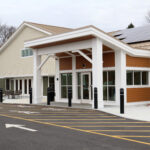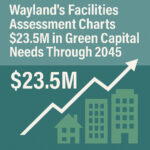The Wayland Select Board’s Oct. 6 meeting moved the EV-First vehicle policy closer to adoption.
Sustainability Coordinator Olivia Blaney and Facilities Director Michael Faia presented a revised Electric Vehicle (EV) First Light-Duty Vehicle Policy, the final requirement for Wayland to qualify as a Massachusetts DOER Climate Leader Community. The designation would make the town eligible for $1.15 million in state funding for decarbonization and renewable energy projects. The proposed policy would require departments to consider electric vehicles first when replacing light-duty cars and trucks weighing under 8,500 pounds, while allowing exceptions for operational or cost reasons. The town already owns three fully electric vehicles.
Town Manager Michael McCall supported adoption, saying, “It’s consistent with our Climate Action Mobilization Plan and state goals to be carbon neutral by 2050.” The board requested edits and will vote on the final version at its next meeting.
Playground proposal
Members of the Economic Development Committee (EDC), led by David Vallari and Katie Harris, presented a conceptual plan to activate municipal parcel green space at Town Center. The proposal envisions a natural-style playground, shaded pavilion, small amphitheater and picnic areas to complement nearby businesses.
Estimated costs for initial improvements range from $175,000 to $400,000, depending on scope and materials. A potential splash pad could cost an additional $500,000 with unexplored environmental restrictions due to the former Raytheon property’s past uses.
The board expressed interest in phased improvements while deferring on the splash pad. McCall will meet with the new Town Center owner to explore a public-private partnership and assess site conditions under the Activity and Use Limitation (AUL) agreement. “We just need to make sure we can safely and legally build there before we spend town resources,” said McCall.
Special election ballot question
The board confirmed plans for a special election on December 11 to ask voters whether to reclassify the remaining Department of Public Works (DPW) building construction debt as excluded from Proposition 2½ limits. The move would not increase taxes in FY26 but would shift about $700,000 in debt service outside the levy limit, giving the town more budget flexibility for FY2027. Taxes would increase in FY27 with spending of any of the $700,000 inside the levy limit.
Town Clerk Trudy Reid requested the December date to allow early and mail-in voting before the holidays. The Finance Committee will present its recommendation to the board on October 20, followed by a short Select Board meeting on October 23 to formally set the ballot language.
Town Building security
McCall announced new safety measures for Town Building, including locking the building at 4 p.m. and reopening only 15 minutes before evening meetings. He cited minor security incidents and said other towns follow similar protocols.
Some future public meetings may move to the Council on Aging and Community Center, which has updated technology and larger rooms. “This isn’t about restricting access,” McCall said. “It’s about making sure our staff and residents feel safe.”
Additional topics
An Accessory Dwelling Unit forum co-sponsored with the Planning Board will take place November 12 to educate residents on housing expansion options.
The board voted unanimously to appoint Brian Boggia to the 212 Cochituate Road Advisory Committee as the Affordable Housing Trust’s representative.
The next Select Board meeting scheduled for October 20 will featuring the Finance Committee’s presentation on the debt exclusion and continued discussion of the EV fleet policy.















